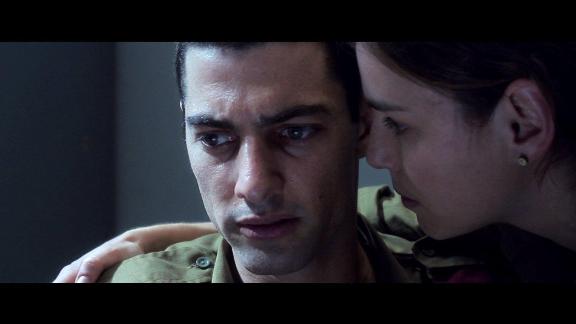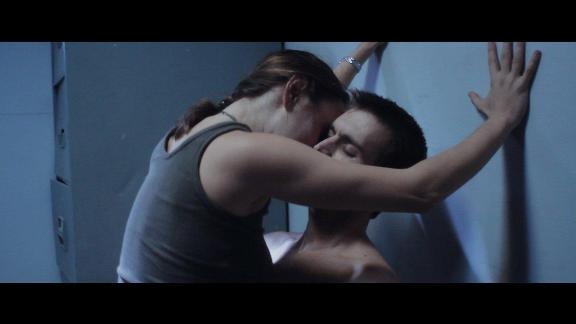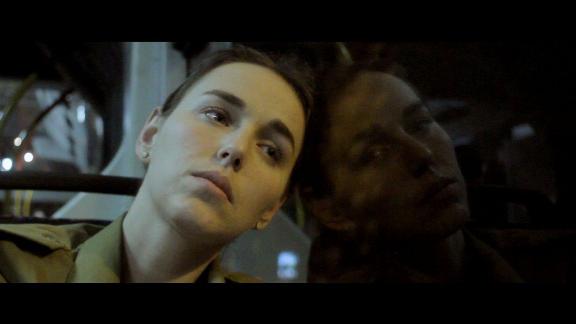There’s an argument in screenwriting to the effect that there are only seven basic plots available to the writer. There’s no point trying to find a story that hasn’t been told already, the argument goes; instead, much better to look for a new angle, a new perspective.
Whilst I’m not sure I entirely agree with this proposition, it did occur to me several times whilst watching Room 514, the psychological drama by first time director Sharon Bar-Ziv, which recently premiered at the Haifa International Film Festival. It’s an army film, one that touches – directly and obliquely – on several of the tropes familiar to Israeli film-making: the Occupation, (Jewish) immigration and its consequences, the sense of masculine entitlement that meanders – often purposelessly – through Israeli society. In this sense, one might think of Room 514 as a film trying to sidestep the seven story dilemma by blending several of the issues familiar to Israeli film watchers. Not that this is an easy cop-out, far from it: a story with more than one driving force stands to lose its way if care is not taken. The trick lies in maintaining a sense of proportion.
Anna (Asia Naifeld) is in the last fortnight of mandatory army service, an investigator with the Military Police. She seems good at her job, combining an iron fist in a velvet glove. Interrogations are a test of wills, a test where despite her position she often starts off at a disadvantage – rank, gender, the perception that she is the punctilious enforcer of pointless rules in an environment where flexibility is a necessary. But she handles it well.

Her personal affairs are another matter. For one thing, she is sleeping with her commanding officer, Erez (Ohad Hall), which is never a very good idea. Especially when he is about to getting married. It’s not just the issue of mixing the personal and the professional, but other issues, subtly hinted but never overtly explored. Erez is a career soldier, Anna a conscript, which suggests at an unhealthy gap in both age, rank and life experience. Between them, they make jokes at the expense of Michali, Erez’s intended. But Anna, a second generation immigrant from a former Soviet republic, presumably knows all about exclusion and being excluded. She seems to have everything under control, but does she? It’s a question that lingers.

But these recede into the background when a routine investigation amongst the ranks takes on a life of its own. Nimrod (Guy Kapulnik), an enlisted soldier, stands accused of a misdemeanour whilst on duty. He hints at wrong doing higher up in the ranks – a check point, a Palestinian family, a needless assault. He suggests that Davidi, his commanding officer, may have been complicit in the wrong doing. To testify as much would be to break ranks, the code of silence that runs through the company. What happens in Samaria, stays in Samaria, one surmises. But Anna, bit jammed firmly between her teeth, is determined to break through the culture of silence. At whatever cost.
The matter of the Israel’s presence in the Occupied Territories is far from new, as is the question of whether the army’s activities can be excused by justification – the special pleading, some might argue – of security considerations. Nonetheless, Room 514 takes its bearings from the management of this dilemma. Erez edges away, hinting that her prey are protected higher up in the chain of command. Davidi – played with insolent bravado by Udi Persi – sneers at Anna, tells her that she dare suggest that he has overstepped his bounds because she has no idea what goes on in the territories. He puts his life, and his men’s lives, on the line night after night. And she challenges his authority?

Left at this, one would conclude that Room 514 is entertaining but derivative. Whilst taken very seriously by some, it is easy to allow oneself to slip into a cynical despair whenever the matter of military misdeeds – anywhere in the world – come to light. You give guys guns and expect them to kill or be killed: one really can’t expect them to be angels, too. That aside, the mise en scene of the film directly recalls 1992’s A Few Good Men – written by Aaron Sorkin, a master in the field of moral dilemma, incidentally. But perhaps when it comes down to it. there are only so many plots that lend themselves to cinematic adaptation; perhaps it’s not the story that ought to concern us so much, but rather how it has been told.
Room 514 has a closed in, claustrophobic feel. Much of the action takes place in the eponymous room, bare to the point of bleakness, sparse and spare. There are lots of closeups, the hand-held camera capturing every nuance and gesture of the players. It isn’t intimate, rather wilfully intrusive. They have nowhere to hide, one feels, either themselves or their thoughts. The colours are washed out greys and browns, and everything seems deliberately stripped of life and vitality. The script carries some of the sensibilities of theatre – text heavily, mannered and very deliberate. The flip side to this is that it consequently carries some of the faults of theatre – a certain stylistic self-indulgence creeps in at times, particularly when the odd scene slips into black and white (yes, one does notice, but only just) and the actors shimmer in and out of focus. Too many quirks spoil the broth, to misappropriate an old adage.
But the heart of the film resides within Asia Naifeld’s performance. The film rests on her – literally, given that she is in every scene – and she carries the burden exceptionally well. It would have been easy for her part to have been subsumed by any one of her individual traits – a woman in a man’s world, a not-quite-adult taking on a responsibility that stretches far beyond her years, the immigrant unexpectedly wielding real power in the most native of Israeli institutions. But she balances these exceptionally well. One gets to spend a lot of time with Anna over the course of the film, and by the end of the film one actually feels at one with her challenges.

And what might this be? Well, it comes down to the question of responsibility. Anna wants Davidi to take responsibility for his actions; Davidi wants to take responsibility for his soldiers and their welfare. Someone has to take responsibility for what falls between the one and the other; by the time Anna understands this, she is no longer in control.
Room 514 was screened at the Haifa International Film Festival, where actress Asia Naifeld received an award for Artistic Achievement in Israeli Cinema for the role of Anna. The Israeli theatrical release date is October 25, 2012.






Comments are closed.